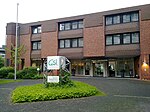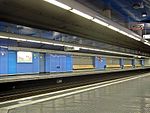Deutsches Museum Bonn
Commons link is defined as the pagenameMuseums established in 1995Museums in BonnNorth Rhine-Westphalia building and structure stubsScience museums in Germany ... and 1 more
Technology museums in Germany

The Deutsches Museum Bonn is a museum with exhibits and experiments of famous scientists, engineers and inventors. Its central themes are research and technology in Germany after 1945. It is part of the Deutsches Museum in Munich. It was founded in 1995 at the instigation of the Association of Sponsors for the Promotion of German Science (Stifterverband für die Deutsche Wissenschaft) in the Science Centre (Wissenschaftszentrum) in Bonn.Museum director has been Andrea Niehaus since 2001.
Excerpt from the Wikipedia article Deutsches Museum Bonn (License: CC BY-SA 3.0, Authors, Images).Deutsches Museum Bonn
Ahrstraße, Bonn Bad Godesberg
Geographical coordinates (GPS) Address Website Nearby Places Show on map
Geographical coordinates (GPS)
| Latitude | Longitude |
|---|---|
| N 50.699667 ° | E 7.149833 ° |
Address
Wissenschaftszentrum Bonn
Ahrstraße 45
53175 Bonn, Bad Godesberg
North Rhine-Westphalia, Germany
Open on Google Maps










